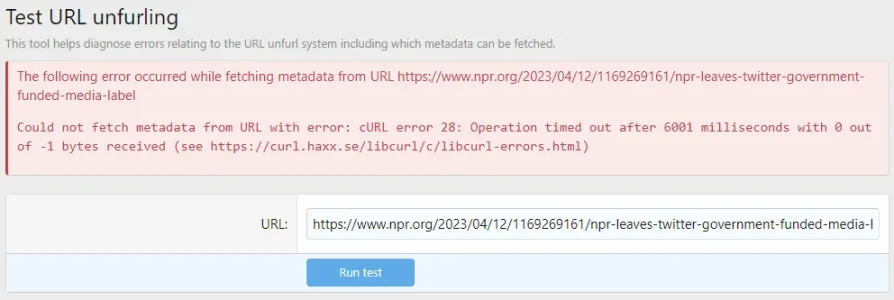Stack trace
#0 [internal function]: XF::handlePhpError(2, '[E_WARNING] cur...', '/var/www/html/t...', 40, Array)
#1 src/vendor/guzzlehttp/guzzle/src/Handler/CurlHandler.php(40): curl_exec(Resource id #71)
#2 src/vendor/guzzlehttp/guzzle/src/Handler/Proxy.php(28): GuzzleHttp\Handler\CurlHandler->__invoke(Object(GuzzleHttp\Psr7\Request), Array)
#3 src/vendor/guzzlehttp/guzzle/src/Handler/Proxy.php(51): GuzzleHttp\Handler\Proxy::GuzzleHttp\Handler\{closure}(Object(GuzzleHttp\Psr7\Request), Array)
#4 src/vendor/guzzlehttp/guzzle/src/PrepareBodyMiddleware.php(37): GuzzleHttp\Handler\Proxy::GuzzleHttp\Handler\{closure}(Object(GuzzleHttp\Psr7\Request), Array)
#5 src/vendor/guzzlehttp/guzzle/src/Middleware.php(29): GuzzleHttp\PrepareBodyMiddleware->__invoke(Object(GuzzleHttp\Psr7\Request), Array)
#6 src/vendor/guzzlehttp/guzzle/src/RedirectMiddleware.php(54): GuzzleHttp\Middleware::GuzzleHttp\{closure}(Object(GuzzleHttp\Psr7\Request), Array)
#7 src/vendor/guzzlehttp/guzzle/src/Middleware.php(57): GuzzleHttp\RedirectMiddleware->__invoke(Object(GuzzleHttp\Psr7\Request), Array)
#8 src/vendor/guzzlehttp/guzzle/src/HandlerStack.php(71): GuzzleHttp\Middleware::GuzzleHttp\{closure}(Object(GuzzleHttp\Psr7\Request), Array)
#9 src/vendor/guzzlehttp/guzzle/src/Client.php(351): GuzzleHttp\HandlerStack->__invoke(Object(GuzzleHttp\Psr7\Request), Array)
#10 src/vendor/guzzlehttp/guzzle/src/Client.php(162): GuzzleHttp\Client->transfer(Object(GuzzleHttp\Psr7\Request), Array)
#11 src/vendor/guzzlehttp/guzzle/src/Client.php(182): GuzzleHttp\Client->requestAsync('get', Object(GuzzleHttp\Psr7\Uri), Array)
#12 src/XF/Http/Reader.php(458): GuzzleHttp\Client->request('get', '
https://www.npr...', Array)
#13 src/XF/Http/Reader.php(129): XF\Http\Reader->_request(Object(GuzzleHttp\Client), 'get', '
https://www.npr...', Array, Object(XF\Http\Stream), Array, NULL)
#14 src/XF/Http/Reader.php(81): XF\Http\Reader->requestUntrusted('get', '
https://www.npr...', Array, NULL, Array, NULL)
#15 src/XF/Http/MetadataFetcher.php(56): XF\Http\Reader->getUntrusted('
https://www.npr...', Array, NULL, Array, NULL)
#16 src/XF/Service/Unfurl/Fetcher.php(22): XF\Http\MetadataFetcher->fetch('
https://www.npr...', NULL)
#17 unfurl.php(71): XF\Service\Unfurl\Fetcher->fetch()
#18 {main}
Request state
array(4) {
["url"] => string(11) "/unfurl.php"
["referrer"] => string(86) "
https://thesnug.space/index.php?threads/elon-musk-closes-deal-owns-twitter.103/page-21"
["_GET"] => array(0) {
}
["_POST"] => array(4) {
["result_ids"] => array(1) {
[0] => string(4) "4670"
}
["_xfRequestUri"] => string(65) "/index.php?threads/elon-musk-closes-deal-owns-twitter.103/page-21"
["_xfWithData"] => string(1) "1"
["_xfToken"] => string(8) "********"
}
}
